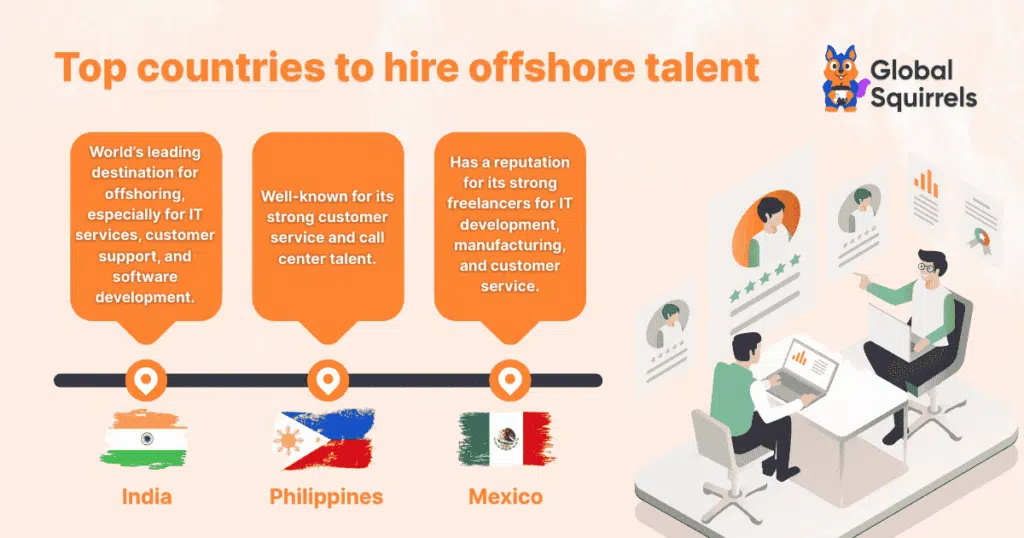Outsourcing vs offshoring: Key differences every business should know

Companies are always finding ways to reduce costs, increase efficiency, and access special expertise. Two strategies that frequently come into play are offshoring and outsourcing. While these terms are usually used interchangeably, they will represent unique approaches with varied operational benefits, models, and challenges.
Outsourcing will involve delegating certain business processes or tasks to an external service provider, which is often within the same country or region, to leverage expertise and efficiency. Offshoring, on the other hand, refers to relocating certain business operations or services to a different country, usually to take advantage of cost savings, global talent, or favorable regulations.
Choosing between offshoring and outsourcing is not always direct. Every approach has distinct implications for quality, cost, communication, and overall business strategy. Misunderstanding these concepts can lead to missed opportunities, operational changes, or inefficiencies.
This blog will explore the key differences between outsourcing and offshoring, which will help businesses to understand when and how to leverage each strategy efficiently. By gaining clarity on these concepts, decision makers can optimize operations, maximize resource utilization, and make informed choices that support both short-term goals and long-term growth.
What is the difference between offshoring and outsourcing?
Usually, companies will confuse offshoring and outsourcing; however, they are distinct strategies that serve multiple purposes. Outsourcing will involve hiring an external service provider, which can be local or international. They will handle certain tasks or functions like customer support, payroll, and IT services. The focus is to leverage external expertise without managing the administration aspect of the business directly.
Offshoring means relocating a part of your business operations to another country. This is done to access specialized talent, reduce labor costs, or take advantage of time zone differences. Offshore teams are owned by the company or managed by a partner, but the key is that the operation is based internationally.
To put it briefly, offshore is about where the job is done, whereas outsourcing is about who does it. In order to maximize productivity, cost, and access to worldwide talent, many businesses mix the two approaches of outsourcing to offshore teams.
Pros and cons of offshoring
Offshoring has become a vital strategy for global companies that are looking to optimize costs, access specialized talent, and scale operations effectively. However, just like any business strategy, it comes with advantages and potential drawbacks. Understanding these pros and cons is important for companies that are considering offshoring as part of their growth plan.
Pros of offshoring
1. Affordable options
One of the primary reasons companies offshore talent is to reduce operational costs. Labor and infrastructure expenses in offshore locations are significantly lower than in the US. This allows businesses to allocate resources to other strategic areas.
2. Enable access to global talent
Offshoring will enable access to highly skilled professionals worldwide. Companies can enter into talent pools with expertise in specialized fields like IT, engineering, software development, finance, and customer support.
3. 24/7 operations
By operating in multiple time zones, offshoring will allow 24-hour business operations. This is really beneficial for customer support, IT maintenance, and global project management.
4. Easy, flexible, and scalable
Offshoring will allow companies to scale teams quickly without any long-term recruitment cycles, which are typical in the home country. Businesses can add or reduce workforce based on project demands efficiently.
5. Focus on the core business functions
By offshoring the administration tasks, companies can focus widely on strategic initiatives, market expansion, and innovation rather than getting weighed down with the routine operations.
Cons of offshoring
1. Challenges in communication
Differences in language, work styles, and cultures can cause misunderstandings, missed deadlines, and inefficiencies if not handled properly.
2. Difference in time zone
While offshoring can allow 24/7 operations, coordinating with teams across different time zones can lead to scheduling challenges for real-time collaboration.
3. Issues with quality control
Maintaining consistent quality can be difficult when the team is working remotely. Companies will need detailed processes and monitoring systems to make sure that the standards are being met.
4. Compliance risks and data security
Offshoring will involve sharing sensitive company data with remote teams. This can raise security-related issues about intellectual property protection, cybersecurity, and regulatory compliance.
5. Employee retention and engagement
Offshore teams will feel disconnected from the company culture and objectives. This can affect motivation, engagement, and retention if not addressed through proper integration strategies.
Along with these challenges, businesses also need to think about how they pay their teams—whether salary or hourly pay. The choice can impact costs, compliance, and employee satisfaction. Learn more in our guide: Difference Between Salary vs Hourly Pay.
Pros and cons of outsourcing
Outsourcing is becoming a popular strategy for businesses that are aiming to focus on the core operations, reduce costs, and hire global talent. However, while outsourcing offers multiple advantages, it also comes with major challenges. Understanding the pros and cons is important for business leaders who are considering outsourcing as a part of their operational strategy.
Pros of outsourcing
1. Cost-effective
Outsourcing allows companies to reduce operational and labor costs by partnering with external providers who can deliver services at less cost than in-house teams.
2. Access to special skills
Businesses can attain expertise in areas that they may not have internally, like IT, digital marketing, finance, and customer support.
3. Focus on the primary activities
By outsourcing the administration tasks, companies could limit their resources and attention to strategic business areas, which drives growth and innovation.
4. Quick turnaround
Specialized outsourcing partners often have the experience and infrastructure to complete projects more quickly than the internal teams.
Cons of outsourcing
1. Less control
Outsourced teams are external to the company, which can lead to reduced control over quality, processes, and project timelines.
2. Challenges with communication
Working with external providers in different time zones or countries will create communication barriers and delays.
3. Risks with data security
Sharing sensitive information with third-party providers could expose businesses to potential privacy or security breaches if it is not managed efficiently.
4. Dependence on external vendors
If a business relies too much on outsourcing partners, it may be exposed if the vendor has problems or doesn’t live up to expectations.
Outsourcing vs offshoring: Which strategy is best for your business?
Choosing between outsourcing and offshoring will depend on the business goals, long-term strategy, and resources. Outsourcing is important for companies that seek flexibility and access to specialized skills without building permanent infrastructure, thus making it perfect for administrative functions or project-based work. Offshoring, on the other hand, will suit businesses that are looking to reduce operational costs, access global talent, and scale operations internationally.
Businesses can expand while maintaining their competitiveness in a global market by using a hybrid approach, which often offers the optimal balance between efficiency, cost savings, and operational management.
Common challenges you may face when hiring offshore talent
While hiring offshore talent will offer various advantages, businesses will encounter some challenges that will require careful planning and management.
1. Compliance and legal risks
Hiring talent from other countries will involve navigating complex legal and regulatory frameworks. Every country has its own set of labor laws, tax regulations, social security requirements, and employment policies. Failing to comply with the laws can potentially expose your business to huge fines, penalties, and legal disputes. Additionally, misclassifying workers or not adhering to local employment standards might create liabilities.
2. Quality control and accountability
Managing quality and ensuring accountability can get challenging when the team is remote and located in a different country. Differences in work culture, professional standards, or time zones can greatly impact consistency and productivity. Without proper oversight, projects might not meet deadlines or desired quality standards.
Without proper oversight, projects might not meet deadlines or desired quality standards. Learn more about overcoming these challenges in our detailed guide on managing remote teams.
3. Data privacy and security concerns
Sharing sensitive business information with offshore teams can create security risks. Companies will have to protect intellectual property and customer data while complying with international privacy laws. Offshore talent has access to confidential systems, thus making it essential to implement strict access controls, NDAs, encryption, and cybersecurity policies.
Deciding between offshoring and outsourcing? Another key decision is selecting the right employment model—whether to use an EOR or a PEO depending on your legal presence and compliance needs. Explore our breakdown: PEO vs EOR: Key Differences & How to Choose.
How Global Squirrels helps you hire offshore talent the right way?
Hiring offshore talent can be complicated; however, with the right partner, it can become efficient, seamless, and fully compliant. Global Squirrels specializes in connecting businesses with skilled professionals across the globe while also managing all the challenges of offshore hiring. Here is how we make it simple and effective:
1. Reduced compliance and legal risk
Navigating labor laws, tax regulations, and employment standards globally can get quite complex. Global Squirrels will take care of the legal and compliance requirements for offshore hires. We will take care of the contracts, payroll, statutory benefits, and local employment regulations, which ensure that your business will stay fully compliant and avoid legal liabilities.
2. Increased accountability and quality control
Maintaining high standards of work across borders can get challenging. Global Squirrels will ensure that every offshore professional is pre-screened, vetted, and matched as per the business needs. We provide tools for tracking performance, setting clear deliverables, and ensuring accountability so your offshore team will consistently meet quality expectations.
3. Reduced security and data privacy concerns
Sharing sensitive business-related data with offshore teams can exhibit data risks. Global Squirrels addresses these concerns by implementing compliance with international data protection standards. This will ensure that the business information remains safe while allowing seamless collaboration.
How does our platform work? What are our hiring plans?
Our platform will allow your business to find offshore talent while also allowing you to manage them efficiently. Our platform will handle all the HR functions, which include payroll setup, benefits administration, task and performance management, timesheet setup, automation of offer letters, and adherence to local and international labor and tax laws. Our platform will make sure you hire an offshore talent most cost-effectively by allowing you to save up to 20% on hiring costs.
Orange plan
The Orange Plan will help you find offshore talent who would meet your business needs. Sign up and select the Orange plan. Fill in details like job title, job description, budget, expected start date, educational backgrounds, skills, and the preferred hiring location. Submit the request, and within 2 to 5 business days, our platform will manage the HR functions, which include payroll, timesheets, benefits administration, performance management, and compliance with local and international labor and tax laws.
Purple plan
The Purple Plan will streamline onboarding for your pre-sourced candidate. Log in and select the Purple Plan. Enter the candidate’s first and last name, email, phone number, work location, job title, and job description, and upload any onboarding documents. Once the onboarding starts, we will take care of the HR tasks, which include payroll, timesheets, benefits administration, performance management, and compliance with labor and tax laws.
Blue Plan
The Blue Plan at Global Squirrels will offer you the opportunity to hire top talent who will work from our dedicated offices. We handle all the administrative tasks, which include payroll, onboarding, timesheets, compliance, and performance management. This will allow you to focus on the core business while we ensure smooth operations and a seamless experience with new team members.
Are you ready to hire offshore talent for your business? Request a demo today!

